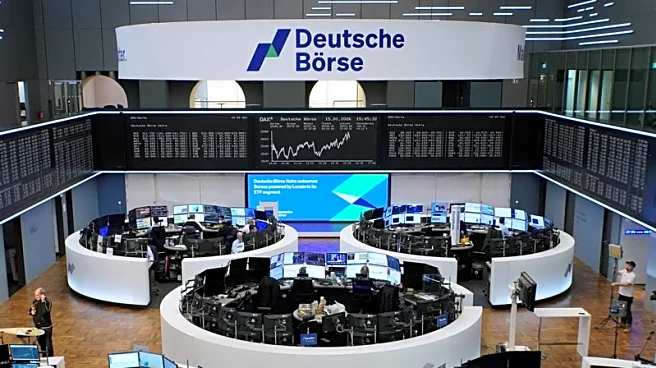Rapid Read • 8 min read
The International Monetary Fund (IMF) has released its annual External Sector Report, highlighting the widening of global current account balances in 2024. The report criticizes President Trump's imposition of higher import tariffs, which his administration claims are intended to increase revenues and address longstanding trade deficits. The IMF warns that escalating trade tensions and tariffs could have significant macroeconomic effects, reducing global demand and increasing inflationary pressures through rising import prices. The report suggests that domestic solutions, rather than tariffs, are needed to address these imbalances. It recommends that China focus on boosting consumption, Europe increase infrastructure spending, and the U.S. reduce large public deficits and rein in fiscal spending.
AD
The IMF's report underscores the potential negative impact of tariffs on global economic stability. By highlighting the risks associated with excessive surpluses or deficits, the report suggests that domestic policy changes are crucial for addressing these imbalances. The U.S., China, and the euro area are identified as major contributors to the widening global current account balances. The report's findings are significant for policymakers and economic stakeholders, as they emphasize the need for strategic domestic reforms over protectionist trade measures. The potential for rising geopolitical tensions and shifts in the international monetary system could further complicate global financial stability.
The report suggests that countries should focus on domestic policy adjustments to address economic imbalances. For the U.S., this means reducing public deficits and fiscal spending. The IMF warns that continued reliance on tariffs could lead to increased geoeconomic fragmentation and long-lasting harm to the global economy. The report also notes the potential for changes in the use of international currencies, with increased use of China's yuan and the emergence of alternative payment systems posing future risks. Policymakers may need to consider these factors in their economic strategies to mitigate potential negative spillovers.
The IMF report raises concerns about the future role of the U.S. dollar in the international monetary system. It suggests that growing geoeconomic fragmentation and weaker demand for U.S. Treasuries could reflect concerns about the U.S. fiscal trajectory. The report also highlights the potential for increased use of China's yuan and private digital assets in international trade and finance. These developments could lead to significant shifts in global currency dynamics, affecting international trade and economic relations.
AD
More Stories You Might Enjoy













